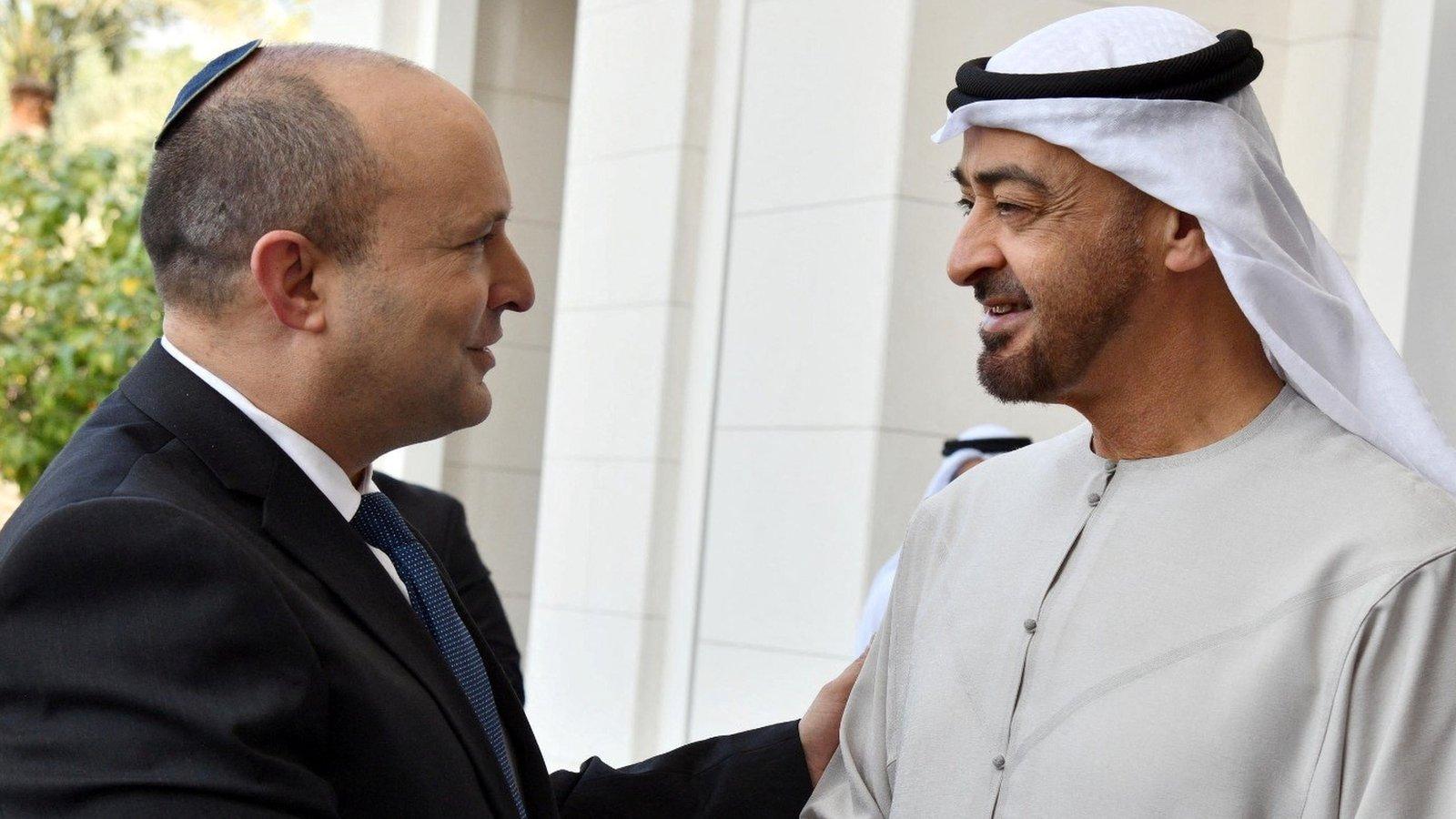Israeli Prime Minister Bennett in first trip to UAE as Iran threat looms
- Published

Naftali Bennett (L) met Crown Prince Sheikh Mohammed bin Zayed (R) at his palace in Abu Dhabi
Naftali Bennett has become the first Israeli leader to visit the United Arab Emirates, as he attempts to deepen ties at a time of rising tensions over Iran.
Abu Dhabi Crown Prince Sheikh Mohammed bin Zayed, the UAE's de facto leader, held talks with Mr Bennett a year after their countries normalised relations.
Israel's prime minister said he wanted to boost economic and commercial ties.
He was also expected to urge the UAE to take a tougher stance in response to Iran's expanding nuclear programme.
The UAE shares Israel's concerns about the potential threat from a nuclear-armed Iran, but it is also trying to establish better relations with Tehran.
The UAE became only the third Arab state to fully recognise Israel last year as part of the so-called Abraham Accords brokered by the US.
The countries have since swapped ambassadors and agreed trade deals worth hundreds of millions of dollars, including agreements on defence and arms development.
Mr Bennett was welcomed by the UAE's foreign minister and an honour guard when he arrived in Abu Dhabi on Sunday night, external.
On Monday, he was photographed shaking hands with Sheikh Mohammed before a meeting that the Israeli prime minister's office described as "historic".
Sheikh Mohammed expressed hope that the visit would "advance the relationship of co-operation towards more positive steps in the interests of the people of the two nations and of the region", the official Wam news agency reported, external.
Before departing Israel, Mr Bennett said that he was "going to discuss ways to further our co-operation in a number of fields, especially strengthening our economic and commercial ties".
Allow X content?
This article contains content provided by X. We ask for your permission before anything is loaded, as they may be using cookies and other technologies. You may want to read X’s cookie policy, external and privacy policy, external before accepting. To view this content choose ‘accept and continue’.

But Israel's Haaretz newspaper reported that Mr Bennett had told meetings that his focus would be Iran, and that there was concern in Israel about recent contacts between Emirati and Iranian officials.
Last week, the UAE's national security advisor, Sheikh Tahnoon bin Zayed, a brother of Sheikh Mohammed, met Iranian President Ebrahim Raisi during a visit to Tehran. Sheikh Tahnoon said he hoped the trip would be a "turning point" for relations between the countries.
The UAE has previously taken a hawkish stance on Iran and, along with Israel, it supported the 2018 decision of then-US President Donald Trump to abandon a landmark deal that limited Iran's nuclear activities in return for relief from international sanctions.
Iran has retaliated against the sanctions reinstated by Mr Trump by gradually violating key commitments under the agreement. It insists its nuclear programme is exclusively peaceful, but it is now enriching uranium to a purity just below the level needed for a bomb.
Mr Bennett has accused Israel's arch-enemy of carrying out "nuclear blackmail" as a tactic in its negotiations with world powers in Vienna that are aimed at rescuing the deal by bringing Iran and the US back into compliance.
He wants US President Joe Biden to end the talks and take action against Iran, including imposing tighter sanctions and preparing for possible military strikes.
The UAE has expressed opposition to such moves and sought to de-escalate tensions.
"We need to avoid a major conflict that will embroil the United States or indeed the countries in the region," presidential adviser Anwar Gargash told the US-based Arab Gulf States Institute last Thursday. "Our interest is to try and avoid it at all costs."

You may also be interested in:
Young Israelis and Emiratis have begun meeting online since their countries agreed to normalise relations